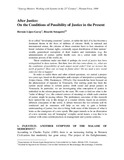After Justice:
Date
2005-01-06Metadata
Show full item recordAbstract
After Justice:
On the Conditions of Possibility of Justice in the Present
(López Garay, Hernán; Sotaquirá Gutiérrez, Ricardo)
Abstract
In so called "developing countries" justice, or rather the lack of it, has become a dominant theme in the lives of millions of citizens. Both, in national and international arenas, the citizens of these countries have to face situations of
brutal violation of human rights, extremely unjust distribution of their nations' wealth, generalized corruption of their leaders and institutions (e.g. the administration of justice, public health care, etc.), unfair trade with the economic powers of the world, etc.
These conditions make one think if perhaps the torch of justice has been extinguished in these nations. But then, how this has come about, i.e., what are the conditions of possibility of such unjust social order? Can we recover the torch of justice? How can we keep its flame alive? Do we need a new social order for this to happen?
In order to tackle these and other related questions, we started a project two years ago, based on the principles and concepts of interpretive systemology (López-Garay, 1986; Fuenmayor, 1991a,b). Our research has been focused on the phenomenon of injustice in Venezuela. Our starting point has been the current social debate to reform justice (both social and penal justice) in Venezuela. In particular, we are investigating what conception of justice is embodied in the reform proposed by the state. We want to find out what is the "order of things" (i.e., the cultural context of meaning) to which such a notion of justice might be paying tribute. The preliminary outcomes of this research have opened the way to the design of a counter reform, based on an entirely different conception of the world. A debate between the two reforms will be conducted and its outcomes will help us not only to gain a holistic understanding of justice, but also to bring forth some of the features of what it looks as the emergence of a new epoch. The paper intends to be an illustration of a new systemic way of "managing" complex social issues, a way that is in contrast with some current practices in management and systems sciences.
This article was published in Synergy Matters: Working with Systems in the 21st Century, edited by Castell, Gregory, Hindle, James and Ragsdell, Plenum Press, New York, 1999.
Collections
Información Adicional
| Otros Títulos | On the Conditions of Possibility of Justice in the Present |
| Correo Electrónico | hlopezg@ula.ve rsotaqui@ula.ve |
| Editor | SABER ULA |
| Idioma | Inglés |






